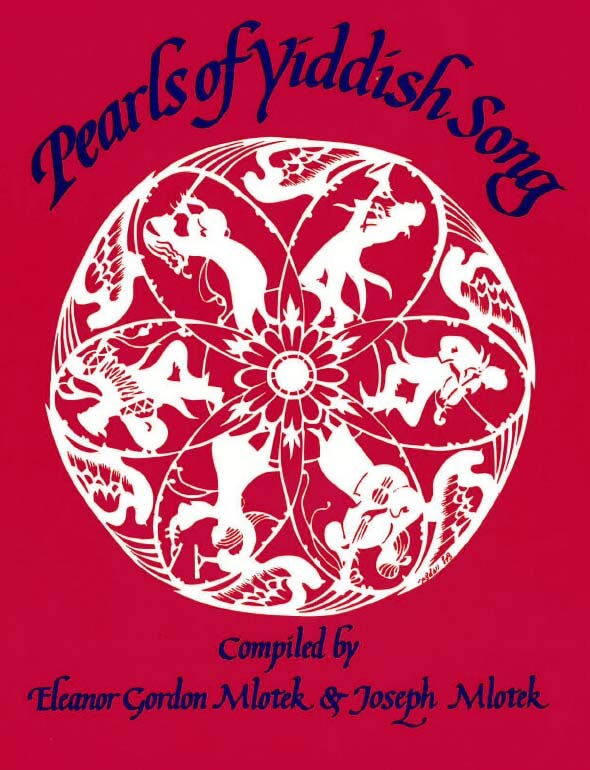Words folklorized from two satiric songs by the Maskilic poet Mikhl Gordon (1823-1890) published in his anonymous collection Di bord… in 1868. The first was entitled “Mayn vide” (My confession): “Ikh shtey far aykh, rebenyu, ikh shtey un tsiter./ Es brent mir in hartsn vi fayer./ Es iz mir nebekh fintster un biter./ lkh vil shoyn vern ayer khosid a trayer.” (I stand before you, dear Rabbi, I stand and tremble. My heart burns like fire. My life is dark and dismal. I want to be your loyal disciple.). In the second poem, “Mayn tshuve” (My repentance), the lines read: “Kh’vet trogn a shat a grinem, a breytn, afile tamuz ven di zun shtark brent…” (I shall wear a large green shawl even in Tamuz when the sun burns fiercely). In the footnote to this poem, the words “afile in di greste hitsn” (even in the greatest heat) appear just as in the folklorized song. Words and music published by Anna Shomer Rothenberg in 1928.
In the Leo Low Collection of YIVO, there is an arrangement by Low in manuscript form. In this version, the word “ikh” in the third line appears as “yakh” (in the Warsaw dialect). This is how compiler Chana Mlotek recalls the song was sung — usually with a shout. The Low manuscript also contains a fourth stanza: “Un shirayim veln mir khapn/ Mit di greste hislayves/ Un a tentsl veln mir geyn/ Oy, s’iz dokh a khayes!” (And we will eat the Rabbi’s crumbs with ecstasy and we will dance — oh what delight!)

Oh my, dear Rebbe,
I stand and tremble
and a fire burns in my heart.
I will be a good Hassid,
a faithful Hassid.
I will rock myself during prayers,
and make all the right gestures.
The Rebbe and his Hassidim,
I am crazy about them.
I will wear a woolen shawl
summertime, in the greatest heat.
I will buy a long, coarse coat,
and a cap with seventy points.
I will immerse myself in the mikve
in winter in the worst cold.
For the Rebbe and his Hassidim
I will move heaven and earth.
Oy-vey, rebenyu,
Ikh shtey un tsiter
Un in hartsn brent a fayer.
Ikh vel zayn a khosidl a giter,
A khosid a getrayer.
Bay dem davnen vel ikh mikh shoklen,
Makhn alerley havayes.
Far dem rebn mit zayne khsidim
Geyt mir oys dos khayes.
A volenem shalik vel ikh trogn
Zumer in di greste hitsn.
A lange zhupitse vel ikh mir koyfn.
A mitsl mit zibetsik shpitsn.
In der mikve vel ikh zikh toyvlen,
Vinter in di greste keltn.
Far dem rebn mit zayne khsidim
Vel ikh aynleygn veltn.
אױ, װײ, רביניו,
איך שטײ און ציטער
און אין האַרצן ברענט אַ פֿײַער.
איך װעל זײַן אַ חסידל אַ גיטער,
אַ חסיד אַ געטרײַער.
בײַ דעם דאַװנען װעל איך מיך שאָקלען,
מאַכן אַלערלײ העװיות,
פֿאַר דעם רבין מיט זײַנע חסידים
גײט מיר אױס דאָס חיות.
אַ װאָלענעם שאַליק װעל איך טראָגן
זומער אין די גרעסטע היצן;
אַ לאַנגע זשופּיצע װעל איך מיר קױפֿן,
אַ מיצל מיט זיבעציק שפּיצן.
אין דער מיקװה װעל איך זיך טובֿלען,
װינטער אין די גרעסטע קעלטן.
פֿאַר דעם רבין מיט זײַנע חסידים
װעל איך אײַנלײגן װעלטן.
Song Title: Oy Vey, Rebenyu

First published in 1988 as Pearls of Yiddish Song: Favorite Folk, Art and Theatre Songs, this anthology contains 115 songs. Some material had never been published, while others, included in rare song collections or sheet music, were largely inaccessible. The songs presented reflect Jewish life in Eastern Europe and the United States and depict childhood, love, family celebrations, poverty, work and struggle. There are also songs from the Hasidic and Maskilic movements, songs of Zion and of America, as well as songs from the Yiddish theater.
The title of this anthology derives from the weekly two-page feature column “Pearls of Yiddish Poetry,” which the compilers Yosl and Chana Mlotek initiated in 1970 in the Yiddish newspaper Der Forvertz (the Yiddish Daily Forward). Hundreds of readers from around the world — including authors, composers, singers, actors — became co-participants in this collective folk project and recalled melodies, lines, fragments, stanzas and their variants of songs, poems, and plays which they had heard in their youth. At first, readers sent in only written material. Later, they also taped songs on cassettes, many of whose melodies had, until then, never been recorded. They also identified and supplied missing information regarding lyricists, poets, and composers and described the circumstances surrounding the songs’ origins, their dissemination, diffusion and impact.